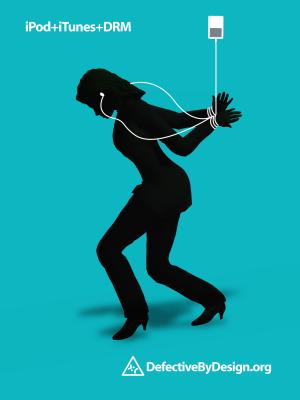Lawrence Lessig is a great man. He fought against the 1998 retroactive copyright extension in the U.S. supreme court, and he has been central in the movement to make copyright law more reasonable.
But I must admit some disappointment that we disagree in some fundamental way, though I'm not sure in what way precisely. As I was reading his book, Free Culture, I noticed that he referred, over and over, to "intellectual property" (IP) as "property". As I've said, I strongly disagree with the conflation of "intellectual" and "physical" property: they are not the same at all. Their properties are hardly related; logic that applies to one rarely applies to the other. I was surprised that he made little distinction between the two. Personally, I use the term "intellectual property" only because English doesn't offer another term. If it were up to me, intellectual property would have its own unique word, "yatterdote" or "tokentine" or "wektution" or something, because it is a unique beast, distinct from any other concept. Our laws, seemingly more and more, conflate the two forms of property; I wasn't expecting Dr. Lessig to contribute to the phenomenon.
...although copyright is a property right of a very special sort, it is a property right.
- Free Culture, p.64
Although the text makes it clear that the two kinds of property are different, I am left with the general sense that Dr. Lessig still tends to apply physical-property thinking to IP.
Something I find interesting in the book is his eagerness to condemn "piracy", while leaving the concept of piracy vague.
I believe that "piracy" is wrong,and that the law, properly tuned, should punish "piracy," whether on or off the Internet. (p. 10)
I think this is deliberate; the book explores the idea of piracy and shows through many historical examples that it is not as clear cut as many claim. To the contrary, an entire chapter of examples shows how positive technological and cultural change was facilitated by what some (including Lessig himself, if you read the book literally) called "piracy".
But I have a little problem with his moral solidarity on the matter of commercial piracy:
All across the world, but especially in Asia and Eastern Europe, there are businesses that do nothing but take others people’s copyrighted content,copy it,and sell it—all without the permission of a copyright owner. The recording industry estimates that it loses about $4.6 billion (that works out to one in three CDs sold every year to physical piracy worldwide). The MPAA estimates that it loses $3 billion annually worldwide to piracy.
This is piracy plain and simple. Nothing in the argument of this book, nor in the argument that most people make when talking about the subject of this book, should draw into doubt this simple point: This piracy is wrong. (p. 63)
On the face of it, that statement is hard to disagree with--except for the figures, of course. A great many bloggers have rebuked the MPAA and RIAA for their piracy loss figures, which generally appear to have come from thin air. But I'll give Lessig the benefit of the doubt and assume that
these figures are reasonable, since it is their internet piracy figures that are generally considered suspect.
Setting that issue aside, I'm troubled by the way he justifies his statement:
Which is not to say that excuses and justifications couldn’t be made for it. We could, for example, remind ourselves that for the first one hundred years of the American Republic, America did not honor foreign copyrights. We were born, in this sense, a pirate nation. It might therefore seem hypocritical for us to insist so strongly that other developing nations treat as wrong what we, for the first hundred years of our existence, treated as right.
That excuse isn’t terribly strong. Technically, our law did not ban the taking of foreign works. It explicitly limited itself to American works. Thus the American publishers who published foreign works without the permission of foreign authors were not violating any rule. The copy shops in Asia, by contrast, are violating Asian law. Asian law does protect foreign copyrights, and the actions of the copy shops violate that law. So the wrong of piracy that they engage in is not just a moral wrong, but a legal wrong, and not just an internationally legal wrong, but a locally legal wrong as well. True, these local rules have, in effect, been imposed upon these countries. No country can be part of the world economy and choose not to protect copyright internationally. We may have been born a pirate nation, but we will not allow any other nation to have a similar childhood.
Now here's where I say "wait a minute". The professor seems to be saying that the "pirated" book market that existed in the U.S. over a hundred years ago was O.K., because there was no law against it. And whether this is his view or not, it should be noted that many who lived at the time welcomed the pirated book market because it promoted learning as well as giving people broader access to entertainment (remember, books were the tool of choice to entertain oneself at the time.)
Then he says pirates in Asia are doing something unquestionably wrong, morally and legally, because there are laws in Asia against piracy. I'm already starting to disagree, since I don't believe that the law per se dictates what is moral and immoral. That is backwards. Rather, it should be morality that guides the law. But as Lessig admits in the very same paragraph, the local laws in Asia were imposed on them. They were imposed by such treaties as the WTO's TRIPS Agreement. While the individuals who wrote it and backed it may be hard to determine, it was clearly created and imposed by western interests, interests that do not want the people of poorer countries to enjoy the lower prices that gave the United States such a boost more than a century ago. The way international organizations like the WTO impose their power over the laws of eastern and southern countries makes it ironic when Lessig says this:
If a country is to be treated as a sovereign, however, then its laws are its laws regardless of their source. The international law under which these nations live gives them some opportunities to escape the burden of intellectual property law. In my view, more developing nations should take advantage of that opportunity, but when they don’t, then their laws should be respected. And under the laws of these nations, this piracy is wrong. (p. 64)
The irony is that international law can sometimes be a tyrant, bypassing sovereignty. In the case of TRIPS, some people have made a convincing case that it has.
I'm not saying that commercial piracy is ever the right thing to do. I remain uncomfortable with the idea, and I myself would never commit commercial piracy, nor would I knowingly pay a pirate for a commercial work.
But I live in Canada, a rich country, and now that I have money, I can generally afford to buy my software at full price. When it comes to poor countries, I am very reluctant to judge them. Lessig is not. Although he says...
Alternatively, we could try to excuse this piracy by noting that in any case, it does no harm to the industry. The Chinese who get access to American CDs at 50 cents a copy are not people who would have bought those American CDs at $15 a copy. So no one really has any less money than they otherwise would have had. (p. 64)
...he later dismisses the argument by saying:
But where the law does not give people the right to take content, it is wrong to take that content even if the wrong does no harm.
And it's here where I must protest most strongly, or where I would protest, if I wasn't confused. What exactly does he mean by "wrong"? I think the word "wrong", used without qualification, suggests a moral wrong. But his argument against poor-people piracy seems to hinge on the law. Is he saying it is morally wrong to do something that hurts no one, if the law prohibits it? Putting it in another context, is it morally wrong to roll a stop sign when there is no one else around? Should God have sharp words for you about it when you get to the pearly gates? Dr. Lessig should have seen that this argument is not strong enough to accept at face value, yet there it is in the text without any further justification. That's what puzzles me, as Dr. Lessig is a lawyer and tends to be more thorough.
Speaking of God, I am reminded that Dr. Lessig is an athiest:
I don’t believe in gods, digital or otherwise.
This in turn makes me wonder how he defines "morally wrong". If it isn't God that dictates what is right and what is wrong, then there must be some other principle guiding the judgement. I don't know what his guiding principle is, but I can tell you mine. If God is set aside, my personal idea of morality is that hurting others is wrong, and benefitting others is good. This principle, in my mind, overrides all others. While Dr. Lessig eagerly condemns the pirate, regardless of the circumstances, I take note that when someone is poor, buying copyrighted works at the price fixed by a rich western corporation may be very difficult. It is often impossible for a poor person to pay full price for
every work he wants; indeed, even paying for a few works may require a large sacrifice on his part. As a result I see a moral conflict where Dr. Lessig sees none. While I don't question the idea that artists deserve to get paid, I do have a sense of morality that is apparently opposed to Dr. Lessig. When I see that third world children learn less because they cannot afford textbooks, I see a wrong. Not a wrong against copyright holders, but against the children. I see a wrong committed
by copyright interests, whereas Dr. Lessig, in his book, does not.
Many would agree with me here.
The issue of entertainment materials is less clear, because the fact is that no one truly "needs" entertainment to survive. Nevertheless, I am reluctant to condemn CD/DVD pirates, even commercial ones, because I am sure that if they were eradicated, the copyright holders would charge far higher prices, even in very poor countries. This would greatly reduce the amount of materials that poor people could enjoy, even though it would not raise the bottom lines of U.S. corporations or artists or filmmakers very much. Although movies and music are unnecessary for anyone's survival, I think they can make life more fun. If you accept this, then you must wonder why poor people should not be allowed to enjoy what rich people can enjoy, even though it is practical for them to do so. Have they done something wrong? Are we better than them?
I do not think we are better than them, nor do I think that what they have (namely, cheap creative works) should be taken away from them, unless they themselves wish it. But their copyright laws were not designed by them. They were designed by westerners.
Thus, an enticing argument exists that whether pirates are wrong or not, U.S. copyright holders are actually in the wrong by charging excessive prices and attempting to deny poor people access to materials that they could otherwise enjoy. In the context of my central moral principle, they are doing wrong because they effectively hurt the poor, and hurting others is wrong. Now, this argument has cracks in it, but I do think there is some truth in it too.
You might suppose I'm a Robin Hood. But I don't advocate stealing from the rich to give to the poor; I only advocate giving to the poor. You see, where Dr. Lessig sees
taking, I see only
copying. In my mind, there is a world of difference, and I am disappointed that Dr. Lessig does not properly acknowledge it.
Nevertheless, his book is a great read. It brings to light the ways in which IP laws, corrupted by corporate influence, can harm our freedoms and our culture. It tells interesting stories. It shows us how the legal battles created by today's technology mirror the battles of the past. It shows how today's culture and technology wars are the same as those of the past, and it also shows how today's battles are different. It helps us see that creativity is not an isolated phenomenon--creative people always build on top of the work of others, though our laws don't account for this fact. It teaches the meaning and value of free culture.
Most importantly, I hope that this book will make you realize that more than ever before, it is we of the general public who are on the front lines in today's culture war. Our enemies are large corporations and corrupt politicians. It is we, of the internet generation, who must fight it. If we do not fight the culture war, we will lose it.
By the way, I'm less than 1/3 of the way through the book. I may have more to say later...
http://www.free-culture.cc/freecontent/






